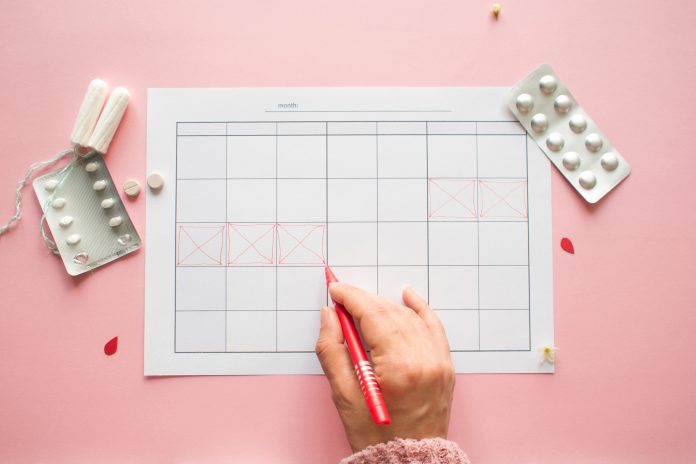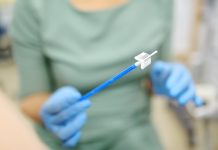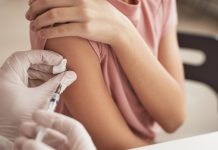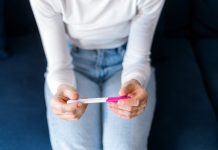Natasha Richardson, Founder of Forage Botanicals and Author of Your Period Handbook, explores the four phases of the menstrual cycle, what defines them and what to expect in each
In 2016 the Eve Appeal did research which showed that only 44% of women could correctly label where the vagina is on an anatomical diagram and 60% couldn’t label the labia correctly (Eve Appeal, 2020)! This is just one example of the ways I have seen people with ovaries failed by their sexual health education at school. But I think the tide is turning. Here we will look at the four phases of the menstrual cycle, what defines them and what to expect in each.
Menstruation (day 1-7ish)
The first phase is menstruation. This is when we are bleeding and usually lasts between 3-7 days. During this phase the hypothalamus is producing gonadotropin releasing hormone (GnRH) which tells the pituitary gland to make follicle stimulating hormone (FSH) which tells the ovaries to mature follicles (Knight, 2016). Follicles are what may become mature eggs, a pre-egg if you will. These developing follicles also signal oestrogen to be produced (Knight, 2016). The first phase is a bit like winter, you may want to stay indoors and rest. You may experience cramps which also make you want to spend the day in bed. It’s a good time to have a day to yourself getting cosy with a hot water bottle.
Follicular phase (day 8-14 ish)
The second phase is called the follicular phase. It usually lasts from the end of menstruation till ovulation, around day 8-14. This phase is called follicular because it is when the follicles are developing thanks to FSH, as one reaches maturity, the others start to die off and this signals the release of luteinising hormone (Knight, 2016). This phase can feel like spring, shaking off your winter coat, getting out into the world again, re-emerging from hibernation. It’s during this phase you will produce cervical mucus which may sustain sperm for up to 7 days (sometimes 10 in rare circumstances) (Knight, 2016).
Ovulation (day 15-21ish)
The ovulatory phase is around day 15-21 but ovulation itself only takes about 15 minutes to occur and the egg that’s released is viable for impregnation for 12-24 hours (Knight, 2016). However, cervical mucous that’s made in the 5-10 days preceding ovulation means you can potentially get pregnant during that time too. This means there is a 5-10 day window where you may conceive (Knight, 2016). This phase of the cycle is jubilant, you will probably feel full of energy and want to go out and party!
Luteal phase (day 22-28ish)
The fourth phase is the premenstrual phase or luteal phase (day 22-28). After ovulation occurs the egg which has travelled down the fallopian tube leaves behind a corpus luteum. It’s like the sack the egg matured inside. This signals the body to produce progesterone and levels of FSH and LH drop as they’re no longer needed. The lowering levels of FSH, LH and oestrogen leads to an eventual shedding of the endometrial lining (your period) if you don’t become pregnant (Knight, 2016). Therefore, you need to ovulate in order to have a period. The bleed you have while on the contraceptive pill is not, technically speaking, a period as you don’t ovulate while on it. Eventually, the drop in hormones will stimulate GnRH and the cycle to begin again (Knight, 2016). But, while you’re in the premenstrual phase you’re likely to feel low of energy, more dreamy and intuitive, creative, and may feel bloated. If you’re not able to take time to yourself away from the demands of the world you may find yourself feeling irritable and short-tempered. Try to jot down anything which annoys you during this time and talk about it with the ones you love later in the cycle when you’ll be better at communicating.
By tracking our cycles for the length of the period and the length from the start of one period to the next we can begin to predict when our next period will happen and therefore schedule some me-time during that sensitive pre-menstrual time. If your cycles are irregular or you have any symptoms to do with your cycle prevent you from partaking in normal life (such as period pain) then see a doctor. But studies have shown that just tracking symptoms you’re experiencing alongside what phase of your cycle you’re in, will help you feel more peaceful about monthly symptoms which are healthy.
References
Knight, J., 2016. The Complete Guide To Fertility Awareness. 1st ed. Routledge.
The Eve Appeal. 2020. It’s Vitally Important To #Knowyourbody. [online] Available at: <https://eveappeal.org.uk/news-awareness/know-your-body/> [Accessed 18 August 2020].











